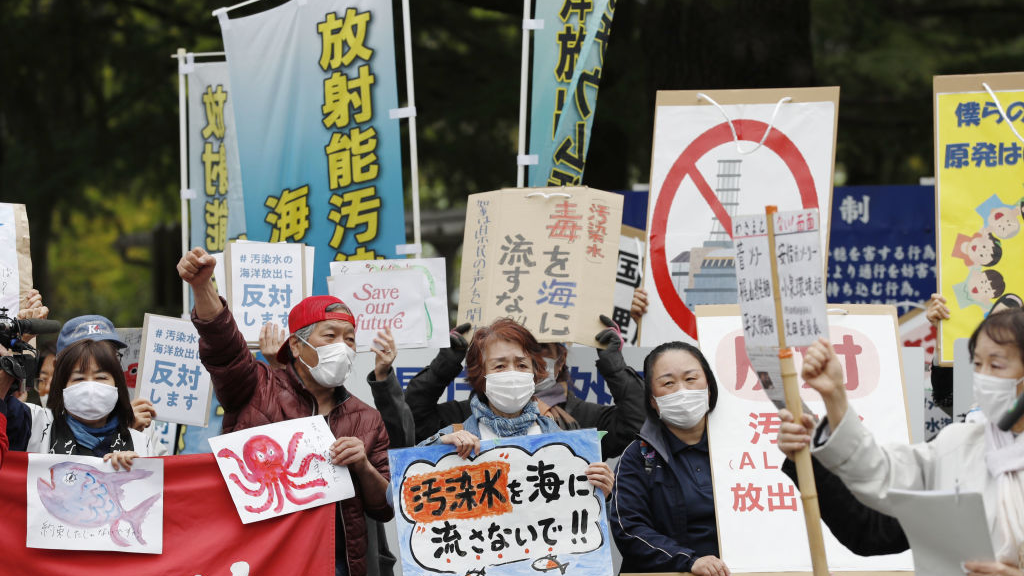
People stage a protest rally in front of the Fukushima prefectural government headquarters in Fukushima, Japan, April 13, 2021. /Getty
People stage a protest rally in front of the Fukushima prefectural government headquarters in Fukushima, Japan, April 13, 2021. /Getty
Editor's note: Zhao Chunlei is a researcher at the Institute for International Dispute Settlement, Tsinghua University. The article reflects the author's opinions and not necessarily the views of CGTN.
The Japanese government had officially announced its decision to release the contaminated water from the wrecked Fukushima Nuclear Power Station into the sea. Not surprisingly, such a move raises fierce opposition domestically and internationally.
Is it in accordance with international standards?
The International Atomic Energy Agency backed the Japanese government's plan, saying that releasing the water into the sea met the global standard of practice in the nuclear industry.
It is confusing as this is the first time in the world that any plant is dealing with such a large amount of wastewater resulting from a nuclear accident. There is no precedent or international standard set for such a situation.
Also, the scientific community has not reached a consensus on the safety of the discharge. In any case, the uncertainty of this contentious issue should tilt the scales toward refraining from doing so.
Is it the most reliable option?
Among the various disposal methods, the Japanese government chose to dump the water into the sea as the most "reliable" option and claims that the practice was common at nuclear power plants around the world.
In this regard, two premises need to be made clear. First, the contaminated water from a nuclear accident should be differentiated from the wastewater from a well-functioning nuclear power station. Second, Japan's capacity, not the plant's manager, TEPCO, should be the subject of the evaluation.
Which method is the most reliable might need further assessment, but it is certain that the current choice is the one that is most beneficial to the Japanese government itself.
Does it risk violating international law?
Based on the international treaties that Japan has given consent to, the current Fukushima discharge plan puts it at the risk of violating various international obligations, which may further bring state responsibility and reparation duties.
It has an obligation to protect the marine environment.
As stipulated in Article 194 of the United Nations Convention on the Law of the Sea (UNCLOS), states should make an effort to protect the marine environment by taking the necessary measures to prevent, reduce and control pollution.
As such, Japan not only bears the general obligation to protect the marine environment, but it is responsible for taking effective precautionary measures to prevent the environmental risk that may be brought by its disposal method.
It also has an obligation to prevent damage across the boundary.
States have the responsibility to ensure that activities within their jurisdiction or control do not cause damage to the environment of other states or areas beyond the limits of national jurisdiction. This is confirmed by a number of cases and codified in different international conventions.
Since the nuclear residue will drift in the currents to the areas beyond Japan's jurisdiction, discharging the contaminated water into the sea will undoubtedly negatively affect other states.
It has an obligation to provide requested information and respond to consultation.
According to the Convention on Early Notification of a Nuclear Accident Article 6, as the responsible State for the Fukushima nuclear accident, Japan shall "respond promptly to a request for further information or consultation sought by an affected State Party." The UNCLOS also provides a similar duty.

A South Korean college student shaves her head in a protest against Japan's decision to release radioactive water from the Fukushima Nuclear Power Plant into the sea, in front of the Japanese Embassy in Seoul, South Korea, April 20, 2021. /Getty
A South Korean college student shaves her head in a protest against Japan's decision to release radioactive water from the Fukushima Nuclear Power Plant into the sea, in front of the Japanese Embassy in Seoul, South Korea, April 20, 2021. /Getty
Thus, all the affected states have a right to request information regarding the Fukushima wastewater discharge, and Japan correspondingly is obligated to provide further information and/or hold consultations.
Is it obligated to cooperate with other states?
Section 12 of the UNCLOS clearly states that contracting states have a duty to cooperate on a global or regional basis to protect and preserve the marine environment.
Therefore, Japan bears the obligation to cooperate with other states, which it is suggested to be realized by establishing a joint technical working group with all stakeholders to assess Japan's treatment proposal, supervise the implementation of an agreed plan and publish relevant reports thereof.
What about state responsibility and reparations?
According to the Draft Articles on Responsibility of States for Internationally Wrongful Acts, if the implementation of the treatment plan is defined as a breach of Japan's international obligation and is attributable thereto, it will constitute an internationally wrongful act and further entail international responsibility and the obligation of full reparation.
What can stakeholders do?
Although probably being the very last option, the possible international and domestic recourse to hold Japan to account can be used to exert pressure on it to seriously consult with other states. An ex ante control of the discharge plan must be preferred to ex post responsibility and reparation.
Japan's current treatment plan throws new legal, political and scientific issues to the world. Not only Japan but also other states need to treat the Fukushima wastewater disposal issue with great care.
Japan has long been striving to define itself as a "responsible superpower." However, its current discharge plan disregards the negative effect on the environment and human rights. It is hoped Japan will refrain from sacrificing the global marine environment and international public health and safety in exchange for its political and economic interests and be a real responsible state in constructing our maritime community with a shared future.
(If you want to contribute and have specific expertise, please contact us at opinions@cgtn.com)

